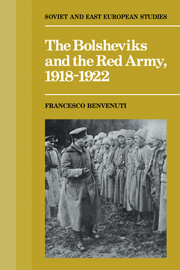Book contents
6 - Rupture and reconciliation
Published online by Cambridge University Press: 03 October 2009
Summary
A new emergency
Some of the measures that the 8th Congress had approved began to be implemented within a few weeks of its closure. The most important of these had to do with the central organs in charge of political work in the army. In April 1919, the VBVK was abolished and in May an RVSR political department was set up in its place, though it was given the official title PUR (the Political Administration of RVSR). Smilga, Beloborodov, Serebriakov, and Rakovskii were appointed to run it. With the exception of Beloborodov, who had only been voted onto the Central Committee at the recent Congress, all these leaders had for a long time been members of the party's leading body. In contrast, Iurenev, the head of the abolished VBVK, had never been a member of the Central Committee.
General agreement had probably been reached over Smilga's appointment. As will be recalled, Kamenskii had mentioned him in his article as the man who had had the courage to stand in the way of the alleged acts of arbitrary repression ordered by Trotskii against communist commissars. His name also figured among the men whom Stalin and Dzerzhinskii recommended at the time of the enquiry into the fall of Perm' as worthy to take over the command of the 3rd army. At the same time, a man who on the eve of Congress had proposed the abolition of political commissars, and a transition to a system of one-man command, could in no way be suspected of harbouring excessively narrow party feelings. At the beginning of April, Trotskii himself wrote a letter to the Central Committee requesting that Smilga be appointed to RVSR.
- Type
- Chapter
- Information
- The Bolsheviks and the Red Army 1918–1921 , pp. 129 - 161Publisher: Cambridge University PressPrint publication year: 1988



